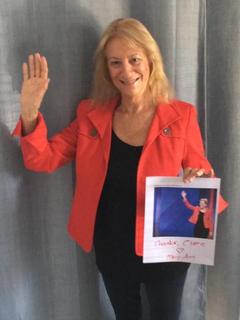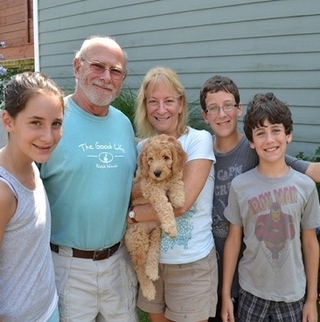
NEWS: On August 28, 2021, Governor Ned Lamont hosted a ceremonial signing of a bill called the "Justice for Pidgie D'Allessio Law" at the Connecticut Sate Capitol. He then presented a check to Pidgie's son on her behalf for the reward she was denied 38 years ago by the Connecticut Supreme Court. If you don't know Pidgie's story, it is the epilogue to my memoir, Girls of Tender Age. You can read the epilogue and see the signing ceremony video by clicking "Justice for Pidgie" on the menu bar.
MY BIO FOLLOWED BY AN INTERVIEW WITH CATHERING CRYER, COURT TV.
I was born and raised in Hartford, Connecticut, leaving Connecticut for the two years I served as a Peace Corps volunteer in Cameroon. I lived in Buea, a town situated on a series of ledges five thousand feet up the side of Mt. Cameroon, an active volcano. The mountain rises nearly 14,000 feet above the equatorial sea. A few days each year, when the dawn sun lights up the peak, I could see it was topped with snow. Then the school bell would ring a certain code, and the children would spring from their beds and meet up at the school within ten minutes. The teachers would lead them, running up the mountainside to play in the snow which would melt by noon.
Recently, I left Connecticut once again, to live a half-block from the Gulf of Mexico on a barrier island that takes the brunt of any hurricane leveled at the city of Fort Myers. Most fortunately, I have a beach-loving family and a labradoodle named Saltalamacchia, also a beach-lover. Salty is my first dog.
My grandparents on my father's side emigrated from the Italian Piedmont, and on my mother's, Quebec. My fondest childhood memories are of sweltering summers blue-crabbing with my French-speaking grandfather from 5 a.m. until 5 p.m., my grandfather wearing a worn three-piece suit and cap. When I told my Italian grandfather that I would be going to Cameroon as a Peace Corps volunteer he told me there were very good grapes grown in Africa.
My brother was autistic, a savant, who would not allow singing, laughing, sneezing, electronic sound (including television, radio and anything that produced music), and the flushing of the toilet except when he was asleep and he never seemed to be asleep. He had a library of over two thousand books all on WWII. As his adjutant, I attained a vast pool of knowledge on such things as identifying fighter bombers from their silhouettes and why we dropped the atomic bomb. "To win the war," Tyler told me. "But it didn't work so we dropped another one. Victory at last."
The relationship with my brother was one of three influences on my writing; the second, my father's bedtime poetry and prose following the "Our Father" and "Hail Mary": "My name is Ozymandias, King of Kings. Look upon my works ye mighty and despair!" The third influence was the shelf of classic children's literature my mother kept stocked with gems: The Swiss Family Robinson, Bambi, Tom, the Water-Baby, Silver Pennies, King Arthur and the Round Table, The Child's Odyssey. Somehow, The Bedside Esquire (1936) found its way to the shelf and I read the extraordinary short fiction within, including Hemingway's "The Snows of Kilimanjaro," Gallico's Keeping "Cool in Conneaut," Salinger's "For "Esmé with Love and Squalor," Hecht's "Snowfall in Childhood, and "Latins Make Lousy Lovers," by Anonymous who turned out to be Helen Lawrenson, the only woman with a piece in the collection. (Sheesh.) There was also an excerpt from the novel, Christ in Concrete, by Pietro Di Donato, that so bowled me over I decided I would be a writer, too, just like all the writers who wrote fiction for Esquire Magazine in 1936.
After Peace Corps service, I taught, worked as a librarian and got my first freelance writing job with Reader's Digest. The Digest editor assigned me sports and games for How to Do Just about Anything, a book which sold 50 million copies world-wide. Reader's Digest made a vast fortune on that book alone, while the writers earned $25 to $75 dollars per article. I learned economy of language writing such pieces as "How to Play Tennis" in fifty words.
In 2010, I was awarded the Diana Bennett Fellowship at the Black Mountain Institute at UNLV, where I wrote the first draft of my eighth novel, The Honoured Guest: Anne Alger Craven, Witness to Sumter, in Her Words.
My work has been reprinted in the UK, Japan, Germany, the Netherlands and Romania. I have taught fiction and memoir writing at many venues including the Mark Twain House in Hartford, Connecticut, and on the Aran Islands through the National University of Ireland, Galway, and online via this website.
Presently I have reached my highest aspiration: Beach Bum. My husband Charlie, my dog Saltalamacchia "Salty" and I live hard by the Gulf of Mexico on a barrier island. I'm writing a true crime memoir even when my family comes to visit.
maryanntirone@gmail.com

